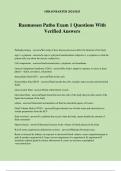©BRAINBARTER 2024/2025
Rasmussen Patho Exam 1 Questions With
Verified Answers
Pathophysiology - answer✔the study of how disease processes affect the function of the body
sign vs symptom - answer✔a sign is a physical manifestation (objective), a symptom is what the
patient tells you about the disease (subjective)
Cell components - answer✔nucleus/nucleolus, cytoplasm, cell membrane
General Adaptation Syndrome (GAS) - answer✔the body's adaptive response to stress in three
phases—alarm, resistance, exhaustion.
Intracellular fluid (ICF) - answer✔fluid inside cells
Extracellular fluid (ECF) - answer✔fluid outside the cells; includes intravascular and interstitial
fluids
intravascular fluid - answer✔fluid within blood vessels
interstitial fluid - answer✔liquid found between the cells of the body that provides much of the
liquid environment of the body
edema - answer✔Abnormal accumulation of fluid in interstitial spaces of tissues.
Fluid Volume Deficit (FVD) - answer✔(hypovolemia) loss of both water and electrolytes in
similar proportions from the ECF
fluid overload - answer✔a condition that occurs when the body cannot handle the amount of
fluid consumed
Hypervolemia - answer✔abnormal increase in the volume of blood plasma in the body
RAAS (renin-angiotensin-aldosterone system) - answer✔Maintain blood pressure;
Renin is released by kidneys in response to decreased blood volume; causes angiotensinogen to
split & produce angiotensin I; lungs convert angiotensin I to angiotensin II; angiotensin II
stimulates adrenal gland to release aldosterone & causes an increase in peripheral
vasoconstriction
, ©BRAINBARTER 2024/2025
Sodium value: - answer✔135-145 mEq/L
Hypernatremia - answer✔increased sodium levels; thirst, muscle twitching, hyper flex is, seizure
Hyponatremia - answer✔1. Headache
2. Seizure
3. Coma
Potassium value - answer✔3.5-5.0 mEq/L
Hypokalemia S/S - answer✔Fatigue, Anorexia, N/V, Muscle weakness, Decreased GI motility,
Dysrhythmias, Paresthesia, Flat T waves on ECG
Hyperkalemia S/S - answer✔Muscle weakness, Bradycardia, Dysrhythmias, Faccid paralysis,
Intestinal colic, Tall T waves on ECG
Calcium value - answer✔9.0-10.5 mg/dL
Hypercalcemia S/S - answer✔Muscle weakness, Constipation, Anorexia, N/V, Polyuria,
Polydipsia, Neurosis, Dysrhythmias,
Hypocalcemia S/S - answer✔Diarrhea, Numbness, Tingling of extremities and around mouth,
Convulsions, Positive Chvostek sign, Positive Trousseau sign, *Pt at risk for tetany.
Magnesium values - answer✔1.5-2.5 mEq/L
Hypomagnesemia S/S - answer✔Anorexia, Distention, Neuromuscular irritability, Depression,
Disorientation
Hypermagnesemia S/S - answer✔Flushing, Hypotension, Drowsiness, Lethargy, Hypoactive
reflexes, Depressed respirations, Bradycardia
Phosphate values - answer✔2.4-4.4 mg/dL
Hypophosphatemia symptoms - answer✔CNS depression, confusion, muscle weakness and pain,
dysrhythmias, cardiomyopathy
Hyperphosphatemia symptoms - answer✔Hypocalcemia• Hyperparathyroidism• Renal
osteodystrophy• Ectopic Calcification
Cardinal signs of inflammation - answer✔redness, swelling, heat, pain, loss of function
Inflammatory response process - answer✔Tissue damage-vasodilatation-edema-heat-redness-
pain




